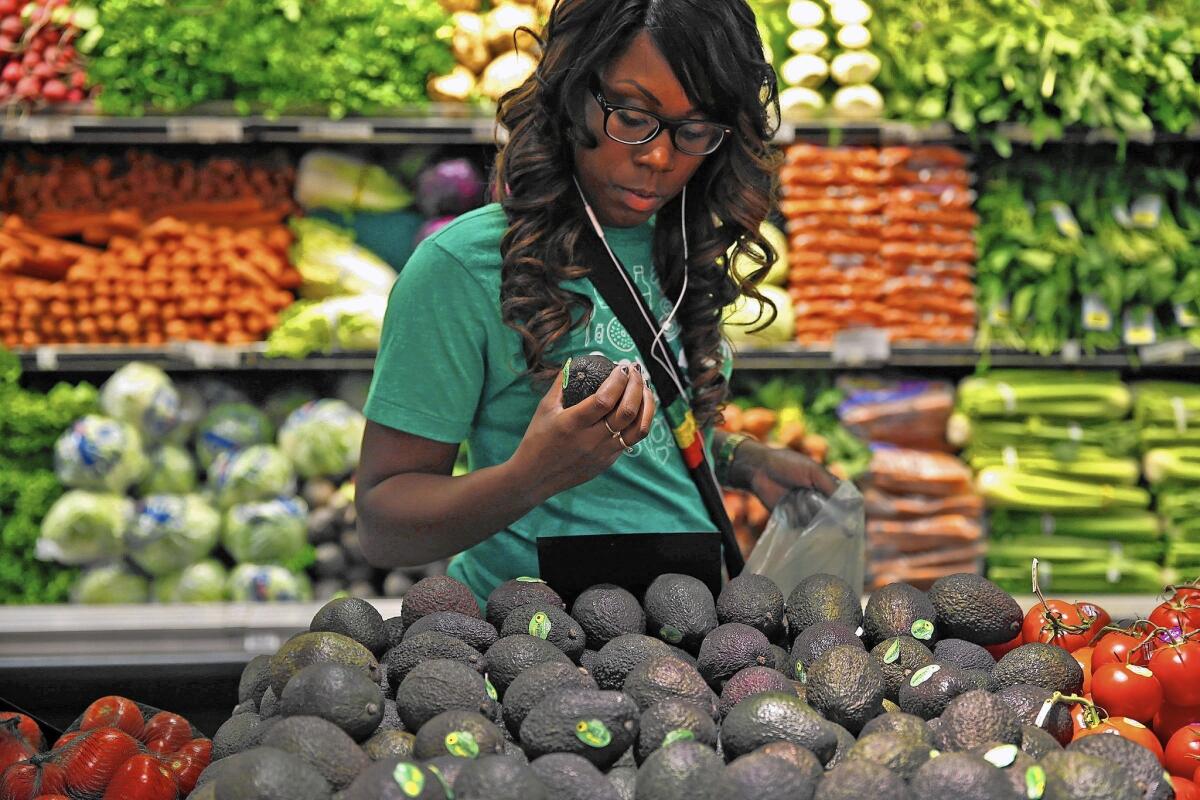Newsletter: Are we bad people for outsourcing pandemic risk to Instacart?

- Share via
I’m Business columnist David Lazarus, with a look today at the way consumers are outsourcing their coronavirus risk.
These are boom times for delivery services. Amazon, FedEx, UPS — they’re all reporting huge increases in deliveries as consumers navigate the stay-at-home pandemic with online orders for everything from food and household staples to upgrades for home-entertainment systems.
Amazon says it’s hiring 100,000 more workers to keep up with demand. Record downloads are being logged for grocery-delivery apps.
And that brings us to an intriguing moral and economic issue.
Just as many consumers have outsourced their driving to Uber and Lyft, and their pickup of to-go restaurant orders to Grubhub, DoorDash and Postmates, they’re outsourcing the risk of venturing to the supermarket to Instacart and similar services that fill shopping carts on customers’ behalf.
Instacart said last month that its sales growth rate had increased by as much as 20 times in California and other hard-hit states as a result of the pandemic.
The company’s founder and chief executive, Apoorva Mehta, said Instacart plans to hire 300,000 more shoppers to prowl supermarket aisles as proxies for anxious consumers.
“The last few weeks have been the busiest in Instacart’s history,” he said. “Today, the role we play and the responsibility we have takes on an entirely new meaning.”
Richard Zitrin, a lecturer on ethics at UC Hastings law school in San Francisco, told me it’s neither unethical nor immoral to hire others to perform tasks we may view as unpleasant or even dangerous.
“But it’s important to recognize the lack of equality among members of society,” he said, noting that the people who can afford to use delivery services may enjoy economic advantages that delivery workers do not share.
“Anyone who doesn’t recognize that reality is kidding themselves,” Zitrin said.
To be sure, the history of capitalism is the history of paying people to do tasks others don’t want to do. It can be argued that as long as people take on such work willingly, and are treated well and compensated fairly, there’s nothing inherently wrong with this.
That matter of fair compensation, though, is a topic for debate. How much of a premium should be charged when some people literally may be putting their lives on the line to get you groceries and toilet paper?
Some Instacart workers went on strike last week to seek improved conditions. Among other things, they’re asking for protective supplies such as hand sanitizer and disinfectant wipes, higher default tips and hazard pay.
The advocacy group Gig Workers Rising is seeking signatures for a petition calling on California policymakers to protect drivers and delivery folk. “By signing, you help to ensure workers have access to benefits like paid sick leave, disability, family leave and unemployment insurance,” the group says.
My wife and I have received one big delivery from Instacart since the pandemic erupted and we were very pleased with the service. We got most of what we wanted, and the woman who dropped our groceries at the front door couldn’t have been nicer.
We thanked her profusely. And we tipped generously.
When you’re outsourcing risk, that’s the least you can do.
Enjoying this newsletter? Consider subscribing to the Los Angeles Times
Your support helps us deliver the news that matters most. Become a subscriber.
Now then, here are a couple of recent stories from our pages worth highlighting:
Mass foreclosures: Mortgage lenders are preparing for the biggest wave of delinquencies in history. If the plan to buy time works, they may avert an even worse crisis: mass foreclosures and mortgage market mayhem.
Expanded workloads: As schools across California and the country closed to prevent the spread of the novel coronavirus, millions of parents suddenly became de facto teachers, principals and day-care providers. That can mean crowded dinner tables as remote-working parents and children jostle for space.
Recalls
Popular heartburn medicine Zantac and its generic equivalents were ordered to be pulled from shelves by the Food and Drug Administration because of a contamination issue. People should stop taking the meds and throw them away, the FDA said.
Nissan is recalling more than a quarter-million SUVs, trucks and vans to replace potentially dangerous Takata air bag inflators. The air bags can explode with too much force and hurl shrapnel, which it goes without saying you don’t want to happen.
Spare change
With that idea of outsourcing risk fresh in our minds, here are some songs about danger. Kenny Loggins kind of owns the space thanks to “Top Gun.” But let’s not overlook offerings from Ace of Base, Electric Light Orchestra and Kiss. And this disco delight from Chaka Khan.
Stay in touch
Let me know what you think of the newsletter. My email is david.lazarus@latimes.com, or you can find me on Twitter @Davidlaz. Also, tell all your pals to join the party.
Until next time, see you in the Business section.
Inside the business of entertainment
The Wide Shot brings you news, analysis and insights on everything from streaming wars to production — and what it all means for the future.
You may occasionally receive promotional content from the Los Angeles Times.




